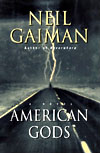
Comment
on this story
|
 |

Entertainment awards are as common as sneezes. Here are two to note.
by Adrienne Martini
Like the Stanley Cup playoffs, the entertainment award season seems to last forever. Starting just as the ball drops in Times Square, someone somewhere is giving some mass-consumed diversion an award. On and on it goes, until a brief respite has been earned—say, around November—only to begin again with the next new year.
The same, of course, holds true in genre fiction, specifically in science fiction and fantasy. Every geek with a web site comes up with his or her own list of merit-worthy speculative fiction and gives an award accordingly, which obliging publishers mention on the cover of the author's next book. While this may provide a tiny ego lift, a great big one can be had by winning one of the majors—either the Nebula or the Hugo.
Usually, the Hugos, which are awarded by SF/F fans at their annual WorldCon, are a pretty good guide to setting up a basic reading list for the field. Most of what are now considered classics—like LeGuin's Left Hand of Darkness, Card's Ender's Game, Gibson's Neuromancer and Heinlein's Stranger in a Strange Land—have garnered a shiny spaceship. But, lately, the books that have won this award have been lacking that nameless sticky quality that makes them remain in the mind of a reader. Last year's award went to the fourth Harry Potter—and while I love Rowling's series, it is hardly what one could consider a classic of this particular genre.
Who knows what's in store for this year—the nominating process is still going on and the convention itself isn't until late August—but I'll lay good odds that the Hugo will go to Neil Gaiman's American Gods, due out in paperback from Harper in May.
Gods is already nominated for a handful of other awards, including a Bram Stoker, which is given to the year's best horror novel. And the Stoker wouldn't be out of place for what is ostensibly a fantasy novel. Gaiman's books have always been difficult to classify; the worlds that Gaiman  creates, like those in the Sandman comics series or Neverwhere, are ethereal and menacing. The same holds true for Gods. While there is no outright hack and slash horror, there is a constant air of foreboding in Gods. creates, like those in the Sandman comics series or Neverwhere, are ethereal and menacing. The same holds true for Gods. While there is no outright hack and slash horror, there is a constant air of foreboding in Gods.
The structure of the novel would be recognizable to anyone who has seen the Wizard of Oz, albeit your understanding would be greatly enhanced if you had been in an altered consciousness during your viewing. Shadow, an ex-con, is released from prison. On his way home, he's intercepted by Wednesday, an enigmatic man who offers Shadow a job he can't refuse. From that point forward, Shadow steps into his own personal Oz, where things are dark and scary and he has little power. Gods come and go, trips are taken (including a climactic scene at our own Rock City), and America is changed.
What works against Gods is that it is a remarkably easy read. Hugo voters seem to prefer a dense tome—after all, both Vernor Vinge and Kim Stanley Robinson, whose books are better than sleeping pills, have been lauded by them. But Gaiman's clear prose lets you better see the roiling depths beneath the surface story. American Gods is a classic example of what modern writers can do with the speculative fiction form, and it would be a shame to have it get lost in the spaceship shuffle.
For folks who prefer writing with a bit more technical muscle, the annual Nebulas are a better bet. Awarded by SFWA, the national organization of SF/F fiction writers, the Nebulas are more like the Oscars to the Hugo's People's Choice. Which isn't to say that a Nebula hasn't been given to a lightweight piece of work, rather that they, on the whole, tend to reward books that are a bit more challenging.
This year is no exception. On the list of nominees are two of my favorite books from 2001: Tim Powers' Declare (Harper pbk due in June, $7.99) and Connie Willis' Passage (Bantam, $6.99). As much as I admire what Powers did with his spy fantasy, Willis' book is a more satisfying read on almost every level.
Willis' career has been a solid one. Her previous books, which include To Say Nothing of the Dog and the Doomsday Book, have been decorated by both Hugo and Nebulas. Passage should be no exception, despite the fact that the cover art make it look like a dippy turn-of-the-century potboiler.
Researcher Joanna Lander is investigating what happens during a near-death experience. The doctor that she teams with discovers how to induce an NDE without actually killing anyone. What follows is equal parts screwball comedy, meditation on death, historical thriller, and classic science fiction. It sounds like a true mess, but Willis delivers the goods and then some. Passage is the sort of novel (science fiction or no) that sticks with you for a while, and, hopefully, her achievement will be recognized.

April 4, 2002 * Vol. 12, No. 14
© 2002 Metro Pulse
|